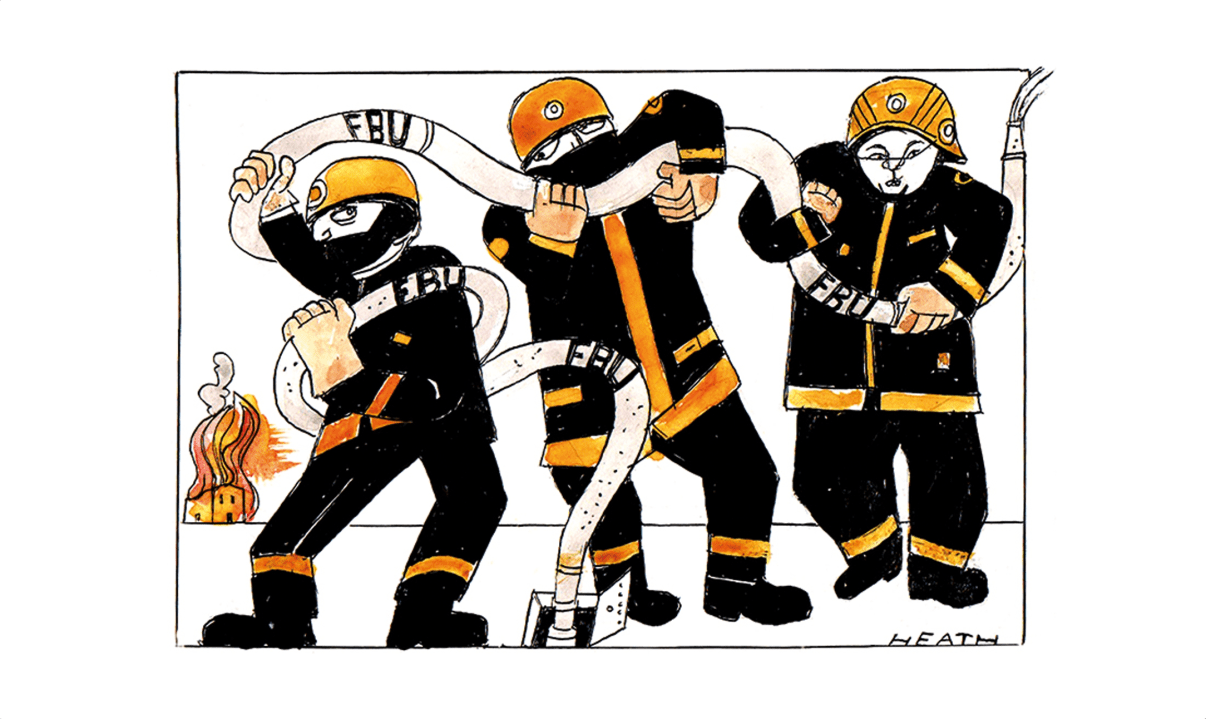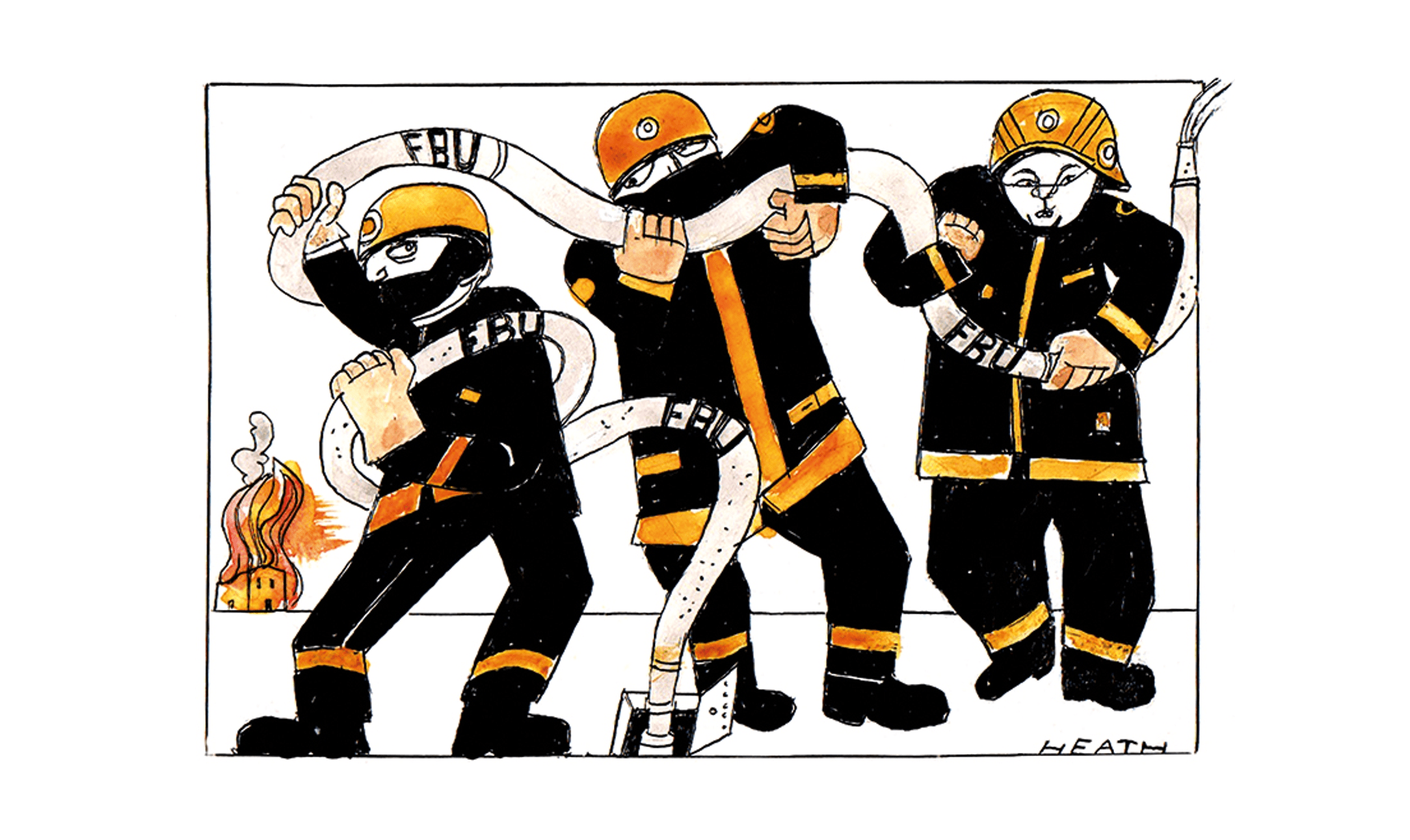From the vaccination programme to the NHS intensive care units, much of the British state has risen magnificently to the Covid challenge. But there is one element of the public realm that has lived down to the lowest expectations of its performance. The Fire Brigades Union, long a byword for militant intransigence in defence of outdated practices, has been at its self-serving, uncooperative worst during the crisis. In place of solidarity and dedication, it has displayed an ‘I’m all right Jack’ mentality as it discourages its members from undertaking humanitarian duties.
The FBU embodies British trade unionism at its most obstructive. It hides behind safety concerns, clings to rigid job descriptions and wallows in labyrinthine bureaucracy. A damning indictment of its irresponsible stance can be found in the latest report of HM Inspector of Fire and Rescue Services, Zoe Billingham, who recently analysed the response of this sector to the pandemic. Her investigation could hardly have been more scathing. In one explosive statement about the union’s insistence on tortuous negotiations for every single additional task requested by managers, she said that ‘the ability of the fire service to deploy firefighters into potentially life-saving activities was limited and delayed’. In effect, while other public service professionals were fighting to protect lives, FBU activists were putting lives in danger.
Billingham’s report is full of this kind of incendiary material. ‘It is deeply regrettable that fire and rescue services would have been better placed to assist local communities at their time of greatest need had it not been for the restrictive industrial relations arrangements,’ she writes. When it came to the vaccination programme, the FBU ‘placed restrictions on firefighters that were unsustainable’. As a result, union members were told not to volunteer for the rollout. In another extraordinary example, Suffolk fire service’s partner agencies asked staff to door-knock vulnerable people who had contacted national helplines, but the FBU ‘refused the request’. Similarly, the Greater Manchester fire service was asked in September to help with the Test and Trace programme, but delays caused by the FBU’s demand for risk assessments meant that full-time firefighters did not start until December.

Because of the FBU’s recalcitrance, fire services tended to rely on the less unionised, part-time firefighters for pandemic duties. Indeed, according to Billingham’s report, ‘around half of all services decided not to use their full-time fire-fighters to conduct activity that was additional to emergency response. The majority of these firefighters stopped all engagement work with the public’. While the part-timers showed ‘strong community spirit’, the FBU full-timers were ‘confined to their stations’ and ‘underutilised’.
Central to the FBU’s unhelpful approach was the so-called ‘tripartite agreement’ with the employers and fire chiefs, which was designed to set out the additional Covid operations that firefighters would carry out. But in the cynical hands of the FBU, the agreement turned into a weapon of mass obstruction, with the union tying up fire chiefs through specific talks over every possible task. As Billingham puts it, ‘the mechanism rapidly became too prescriptive’ and ‘unnecessarily detailed’. To give one example: ‘The agreement to deliver food to the most vulnerable did not extend to firefighters carrying out wellbeing checks.’
While other public service workers were protecting lives, FBU activists were putting lives in danger
In frustration, the employers and fire chiefs pulled out of the agreement last month. Yet the very existence of this arrangement was an indicator of the inflexible stranglehold that the FBU has on the fire service. At a time of national crisis, it is outrageous that a highly politicised, left-wing trade union, with an appalling record of putting its own narrow interests before the needs of the public, should effectively have been allowed a veto on the deployment of firefighters. ‘It is not what the public expect,’ said Billingham on the publication of her report.
But it is exactly what I expected. For 15 years, mainly in this magazine, I have written about the urgent need to break the dangerous grip of the FBU, which has ruthlessly exploited public sentimentality about the fire service to protect its fiefdom and block reform. For my efforts, I have been abused by left-wing activists, some of whom revealed their compassion by expressing the hope that I might be trapped in a burning building. But now, with this report, I feel vindicated. The FBU is exposed for the cruelly inadequate organisation it really is, so warped by political ideology, so hostile to management, and so addicted to the maintenance of workplace privileges that it has completely lost its moral compass.
All too predictably, the FBU described the HM Inspectorate report as a ‘stitch-up’. The union’s long-serving general secretary Matt Wrack said it was ‘a political and biased attack on firefighters’ without evidence. But that is just empty rhetoric. Soon after the report came out, a fire chief backed it up with a complaint that union ‘bullies’ had intimidated firefighters into not volunteering, while Roy Wilsher, chairman of the National Fire Chiefs Council, revealed that one service had been asked to deliver 400 laptops to schools, only for the FBU to reject the request.
The union’s behaviour in the pandemic is entirely in line with its conduct throughout recent decades, as it has endlessly indulged in political blackmail, serial intimidation, threats of strike action and resistance to meaningful change. ‘They slash, you burn,’ was one typical FBU poster during the co-alition government’s austerity drive, featuring images of David Cameron and George Osborne. Wrack even outdoes Unite’s Len McCluskey for zealotry, serving as chairman of the ultra left-wing Labour Representation Committee and as a leading figure in Labour Party Marxists, which aims ‘to replace the rule of the capitalist class with the rule of the working class’.
Instead of dreaming of the revolution, Wrack should accept that his union has failed. The case for change in the fire brigades has been reinforced by a number of recent disasters, such as the Manchester Arena terrorist bombing of 2017, where an official inquiry found that the service had played ‘no meaningful role’ in the immediate aftermath of the blast because safety concerns meant crews arrived two hours late. Now the poor response to the pandemic has made the argument for wholesale reform even more unanswerable. The FBU’s barriers must come down.
The most absurd aspect of the union’s resistance is that, unlike nearly all other public services, the pressures on the fire brigades have eased dramatically in recent years. Whereas ambulance crews are under more strain than ever before, firefighters have far less to do because of the continuing decline in the incidence of fires as a result of measures including the introduction of smoke alarms, the fall in tobacco consumption, the disappearance of domestic coal fires and the advent of flame-retardant materials.
The overall number of incidents attended by brigades fell by 4 per cent in the year to June 2020, compared with 2019, and has dropped by almost half since 2003-04. But most of these incidents did not involve fires at all, 42 per cent of them being false alarms. In fact, there were just 156,128 actual fires in the year to June 2020, a 15 per cent decrease on the previous year and down by two-thirds from the peak of 474,000 in 2003-04.
Against that backdrop, inactivity during the pandemic is inexcusable. The virus will not be beaten by union members sitting in their stations and polishing their helmets.







Comments